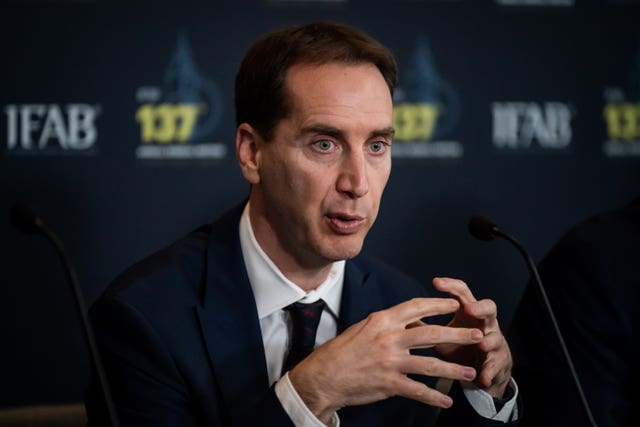Chief executive says FA to review lighting Wembley arch as act of tribute
Mark Bullingham accepted the “hurt” caused to the Jewish community by the FA’s decision.
The Football Association will review whether to continue lighting the Wembley arch as an act of tribute following criticism over its response to the Israel-Palestine conflict, its chief executive Mark Bullingham has said.
Bullingham accepted the “hurt” caused to the Jewish community by the FA’s decision not to light the arch in the colours of the Israeli flag for last Friday’s England friendly against Australia, following attacks on Israeli citizens by Hamas militants earlier this month.
But he set out the steps the FA had taken to respond in what it felt was the most appropriate way to “one of the most complex geopolitical conflicts on Earth”.
“This week has made us question whether we should light the arch and when, and we’ll be reviewing that in the coming weeks,” Bullingham said at the Leaders Week conference at Twickenham.
“I recognise that our decision caused hurt to the Jewish community who felt that we should have lit the arch, and that we should have shown stronger support for them.
“This was one of the hardest decisions we’ve had to make, and the last thing we ever wanted to do in this situation was to add to the hurt.
“We aren’t asking for everyone to agree with our decision, but to understand how we reached it.
“It would be easy for football to ask why we’re the only sport being talked about in this way, particularly when rugby and cricket are in the middle of their World Cups.
“However, you have got to understand, and we understand, that the power of football means it will always be in the spotlight. And that’s just something we we have to accept.”

The FA was heavily criticised by a number of Jewish community groups last week, while Rabbi Alex Goldberg resigned from an FA faith in football group over its response. It was also criticised for not lighting the arch by Lucy Frazer, the Cabinet minister responsible for sport.
Bullingham set out the steps the FA had taken to reach the position it did.
“We first saw the acts of terror unfold on Saturday, October 7, along with the rest of the country. We immediately wrote to the Israeli FA to communicate our horror at what was taking place,” he said.
“We knew the situation could move very, very quickly, and was likely to escalate, so we wanted to have expert guidance, and more information available on what we should do because we had a match on Friday against Australia.
“We also spoke with our Australian colleagues and other stakeholders in the game to understand the views of players, clubs, and also of the leagues.
“It’s worth noting that the Australians had upcoming games against both Palestine and Lebanon, so their desire for neutrality was obviously incredibly strong.
“We then had a long board meeting on the Wednesday night and heard from experts on what is one of the most complicated geopolitical conflicts on Earth.
“They then left the room and we had a debate on working out what we should do.
“We all felt then, and we all feel now, that football should stand for peace and humanity and the wish to show compassion for all innocent victims of this terrible conflict.
“Our compassion and sympathy is clearly for families and children in particular.
“We then held a minute’s silence and wore black armbands recognises issuing a statement together with the Australian Federation to explain our actions, which many other sports then followed with identical wording, and our language was also very similar to that used by the United Nations.
“We were the only football body in Europe to have a minute’s silence, which was, as I said, for all innocent victims.”




